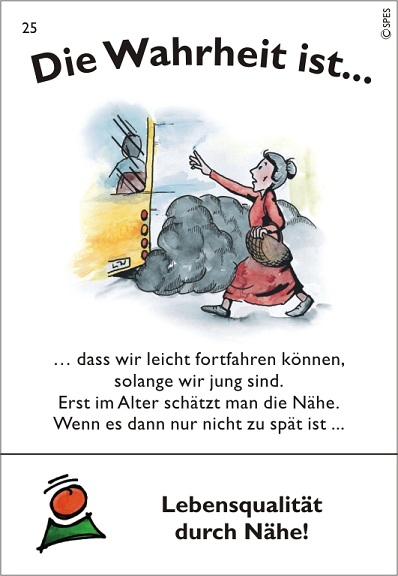Base de données des projets PDR
Quality of Life through Proximity (Lebensqualität durch Nähe - LQN)
Summary
The project aims to develop and exchange via a joint forum solutions that ensure the provision of basic services and local supplies in rural areas, thus addressing today's principal challenges - demographic change and the current economic climate.
Lead Partner
LAG Partner(s)
Background
Rural areas nowadays are facing challenges such as lack of public financing, the reduction of jobs and demographic change. At the same time the withdrawal of local suppliers such as grocery stores, banks and post offices (high maintenance cost vs. low purchasing power) represents an increasingly important issue. If the quality of life is to be maintained or even improved solutions must be found i.e. innovative and integrated concepts that can provide all-inclusive services and local food supply.
Common Objectives
The overall aim was to support local communities in developing sustainable concepts for projects securing and improving the quality of life in rural areas. The specific objective was to ensure sustainability through: 1) the involvement of citizens in project development, thus generating fresh commitment, and; 2) their involvement in transnational cooperation, in order to instigate new ideas & the consideration of examples of innovative practice.
Main Joint Activities
Partner region visits focused on innovative projects ensuring quality of life in rural areas. Transnational training courses, held each in the Austrian and German partner regions, comprised of 6 modules and a final symposium. Two modules were carried out jointly, particularly focusing on know-how transfer on the main topics ‘securing local supply’ and ‘demographic change’. Participants were trained not to simply copy, but to tailor own projects meeting best their local communities’ actual needs.
Results and Transferability
Following field visits to flagship projects and joint training modules/, participants developed solutions meeting their own specific local needs. Elderly people will have a concrete point of contact if they need help, e.g. innovative forms of housing and care (regular meetings, play dates, day care for people with dementia); centres providing a nearby offer for food and other essential goods, coupled with public and private services, social and medical care, communicative and cultural services.
Lessons learnt
The future is in the hands of the citizens. Their commitment and the cooperation of village councillors and mayors will determine the ‘carriers’ of quality of life that will remain available in their local area in the future. Therefore, a structured and facilitated bottom-up process, including awareness raising activities and the implementation of concrete initiatives by project groups is necessary to secure quality of life for elderly people.
Project location and other information
Germany Baden-Württenberg Budget information reflects Austrian partners' project costs only
Total project cost (€)
89 568
EAFRD contribution (€)
28 706
National contribution (€)
30 409
Private contribution (€)
30 453
Project website
Contact name
Ingrid Engelhart
Telephone
+49 761 5144244
Languages for contact
German
Document attachment
Original Language version
At a glance
Countries
Germany, Austria
Number of Partners
4
Final beneficiary type
Public/local authorities, Local Action Group, Other
Budget range
€100 000 - €500 000
Start date:
27/05/2010
End Date:
27/05/2011
Theme / Measure:
• Implementing the LEADER Approach
• Co-operation projects
• 421. Implementing co-operation projects
Keywords:
Quality of life, Healthcare, Leader, Demography, Village facilities
Last update
02/04/2012








